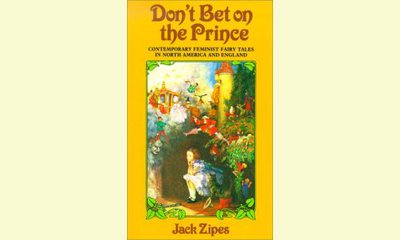|
|
Don’t bet on the prince - A book review
an article by Ana Carla Rodrigues Afonso
It has been a long time since you’ve been looking
for alternative fairy tales without finding
anything worthwhile? If this is your case (and if
it not as well) I invite you to have a look at the
fairy tales’ anthology collected in the essay
‘Don’t bet on the prince’. The anthology was
edited by Jack Zipes in the 1960s and includes
selected works from such writers as Angela Carter,
Margaret Atwood and Jay Williams, and critical
essays about fairy tales analysis through a gender
perspective from Marcia Lieberman and Sandra
Gilbert.

click on photo to enlarge
All the fairy tales contained in the book are
fascinating and in many cases consist in
alternative feminist versions of old and well-
known fairy tales, e.g. ‘Cinderella’ or ‘The
donkey princess’. The added value of these
versions stays in the fact that they provide for
unconventional feminine and masculine roles and
characteristics that are attached to important
learning and life lessons.
One of my favourites is ‘The moon ribbon’ which
deep teachings are connected with women’s and
girls’ empowerment through the discovery of the
capacity to sort out life problems by themselves
(not necessarily being dependent on the ‘prince’
who will come to save them). Another important
learning that can be harnessed to the story is the
importance of women’s legacy inside the family.
This may happen especially through the
transmission of wisdom, by being supportive
towards each other and especially towards the
younger girls and women in the family.
In many of the fairy tales contained in the book,
the idea of ‘the prince who will come one day to
save the girl from the cruelty of a stepmother’ is
deconstructed. In this sense the tales offer
interesting options to this unhealthy model of
relationship. The new models proposed are based on
active girls who take positive and courageous
actions for themselves and the others, showing
commitment towards social problems, for example.
And, as the ‘cruel stepmother’ was mentioned, let
me put forward a provoking question: what does
women learn about the way to relate with each
other through this kind of stories (i.e.,
traditional fairy tales), where women characters
are almost never portrayed as friends and
supportive towards each other, and most often are
in competition or engaged in mean behaviours
towards each other? And, what kind of impact may
these representations have in real life?
To conclude I believe it is important to highlight
the necessity for women to ‘don’t bet on the
prince’ and rather bet on themselves. I don’t
mean with this to be individualistic or live in
solitude for the sake of being independent,
instead I want to stress the importance to
cultivating a wide network of friendships and
loves (i.e., love in its various forms and
possibilities) in which a woman can rely in
different moments of her life. As well, it is
essential to always keep in mind that all women
(as well as men) have infinite resources inside
themselves that they can use to overcome problems
and live a fulfilling life. There is nothing
innate saying women (and men) need to be one way
or another, all human beings should be free to
choose and define themselves and the way they want
to live their lives.
|








|
DISCUSSION
Question(s) related to this article:
What other resources can be utilized to give women more opportunities?,
* * * * *
LATEST READER COMMENT:
On their website, the United Nations Population Fund makes it clear that lack of access to family planning is a form of violence against women.
"Gender-based violence both reflects and reinforces inequities between men and women and compromises the health, dignity, security and autonomy of its victims. It encompasses a wide range of human rights violations, including sexual abuse of children, rape, domestic violence, sexual assault and harassment, trafficking of women and girls and several harmful traditional practices. Any one of these abuses can leave deep psychological scars, damage the health of women and girls in general, including their reproductive and sexual health, and in some instances, results in death.
Violence against women has been called "the most pervasive yet least recognized human rights abuse in the world." Accordingly, the Vienna Human Rights Conference and the Fourth World Conference on Women gave priority to this issue, which jeopardizes women's lives, bodies, psychological integrity and freedom. Violence may have profound effects – direct and indirect – on a woman's reproductive health, including:
Unwanted pregnancies and restricted access to family planning information and contraceptives
Unsafe abortion or injuries sustained during a legal abortion after an unwanted pregnancy
Complications from frequent, high-risk pregnancies and lack of follow-up care
Sexually transmitted infections, including HIV
Persistent gynaecological problems
Psychological problems
Gender-based violence also serves – by intention or effect – to perpetuate male power and control. It is sustained by a culture of silence and denial of the seriousness of the health consequences of abuse. In addition to the harm they exact on the individual level, these consequences also exact a social toll and place a heavy and unnecessary burden on health services.
UNFPA recognizes that violence against women is inextricably linked to gender-based inequalities. When women and girls are expected to be generally subservient, their behaviour in relation to their health, including reproductive health, is negatively affected at all stages of the life cycle.
UNFPA puts every effort into breaking the silence and ensuring that the voices of women are heard. At the same time, the Fund works to change the paradigm of masculinity that allows for the resolution of conflict through violence. . ...more.

|
|









